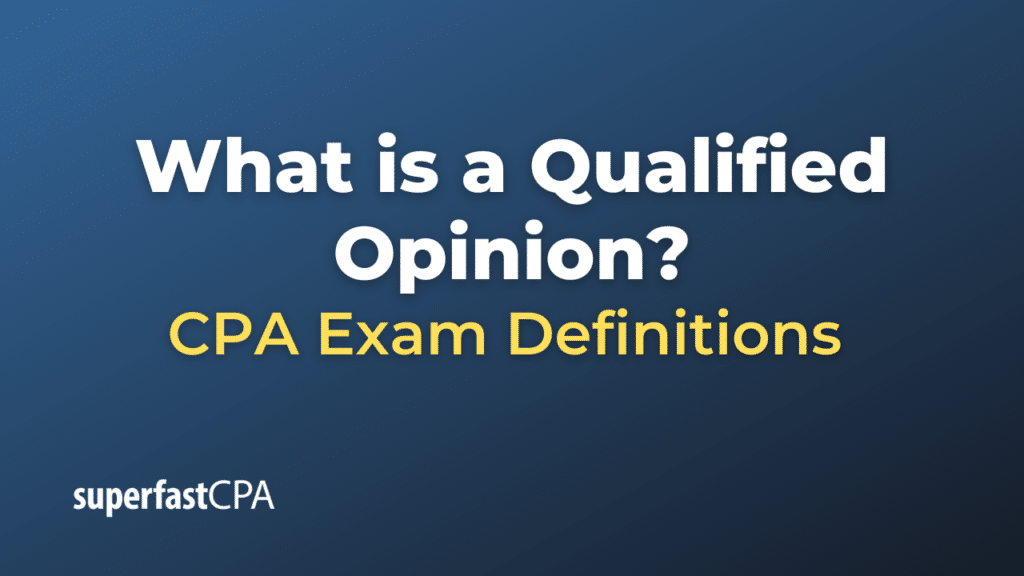Qualified Opinion
In the context of auditing and financial reporting, a “qualified opinion” refers to a statement made by an independent auditor that, for the most part, the company’s financial statements are a fair representation of its financial position, except for a specific issue. A qualified opinion indicates that the auditor has reservations about certain aspects of the company’s financial statements.
Here’s a breakdown of what a qualified opinion entails:
- Reason for Qualification : The auditor has identified a departure from generally accepted accounting principles (GAAP) or another relevant framework, or there may have been a limitation on the scope of the audit which prevented the auditor from obtaining necessary evidence.
- Implications: It suggests that the financial statements may not be fully compliant with GAAP or another relevant accounting framework, but the issues identified aren’t pervasive or widespread enough to invalidate the financial statements as a whole.
- Distinction from Other Opinions:
- Unqualified Opinion (or Clean Opinion): This is the best type of report an auditor can issue. It indicates that the financial statements appear to be presented fairly and in accordance with GAAP without any reservations.
- Adverse Opinion: This is worse than a qualified opinion. It suggests that the financial statements are not in accordance with GAAP and are misleading. An adverse opinion is rare and can have serious negative implications for the company.
- Disclaimer of Opinion : The auditor doesn’t express an opinion on the financial statements, usually because they were unable to complete the audit for some reason or could not verify the statements due to insufficient evidence.
- Impact on the Company : A qualified opinion can raise concerns among shareholders, lenders, and other stakeholders, leading to a decrease in the company’s stock price or increased difficulty in securing financing. However, the impact is generally less severe than that of an adverse opinion or a disclaimer of opinion.
- Example: An auditor might issue a qualified opinion if a company did not provide enough evidence about the valuation of a significant inventory item. If this is the only issue and the rest of the financial statements are accurate, the auditor could still issue a qualified opinion, indicating the potential issue with the inventory valuation.
When reading an audit report, it’s crucial for investors and other stakeholders to understand the nature and implications of any qualifications provided by the auditor. This can offer insight into potential concerns or risks associated with a company’s financial reporting.
Example of a Qualified Opinion
Let’s walk through a hypothetical example to better understand the concept of a qualified opinion:
Company: BlueTech Inc.
Scenario: BlueTech Inc. is a technology company that manufactures innovative wearable gadgets. During an annual audit for the fiscal year 2022, the independent auditors discovered that BlueTech Inc. changed its method for depreciating its manufacturing equipment. The company did not disclose this change or its effects in the footnotes of the financial statements, which is against generally accepted accounting principles (GAAP).
The auditors found the rest of the financial statements to be in accordance with GAAP. The only issue was the undisclosed change in the depreciation method and the potential effects it could have on assets’ reported values and the expenses.
Auditor’s Qualified Opinion: In the audit report, the auditor might state:
We have audited the accompanying financial statements of BlueTech Inc., which comprise the balance sheet as of December 31, 2022, and the related income statement, statement of changes in equity, and cash flow statement for the year then ended.
In our opinion, except for the effects of the matter described in the Basis for Qualified Opinion paragraph, the financial statements present fairly, in all material respects, the financial position of BlueTech Inc. as of December 31, 2022, and its financial performance and cash flows for the year then ended in accordance with generally accepted accounting principles.
Basis for Qualified Opinion:
BlueTech Inc. changed its method of depreciation for manufacturing equipment during the year 2022 and did not disclose this change or its effects in the notes to the financial statements. In our opinion, the disclosure regarding this change is required by generally accepted accounting principles. Had the company disclosed this change, certain figures related to assets and expenses might have been different.
This opinion is to alert the users of the financial statements that, except for this particular issue related to depreciation, the rest of the financial statements are a fair representation of the company’s financial position.”
Impact:
Shareholders, potential investors, and lenders, upon reading the qualified opinion, might approach BlueTech Inc.’s financial statements with caution, particularly concerning asset valuation and related expenses. The company may need to correct the omission or provide a rationale to stakeholders, reassuring them about the financial statements’ integrity.
In this scenario, the qualified opinion serves to draw attention to a specific area of concern while indicating that the overall financial statements are, for the most part, reliable.














